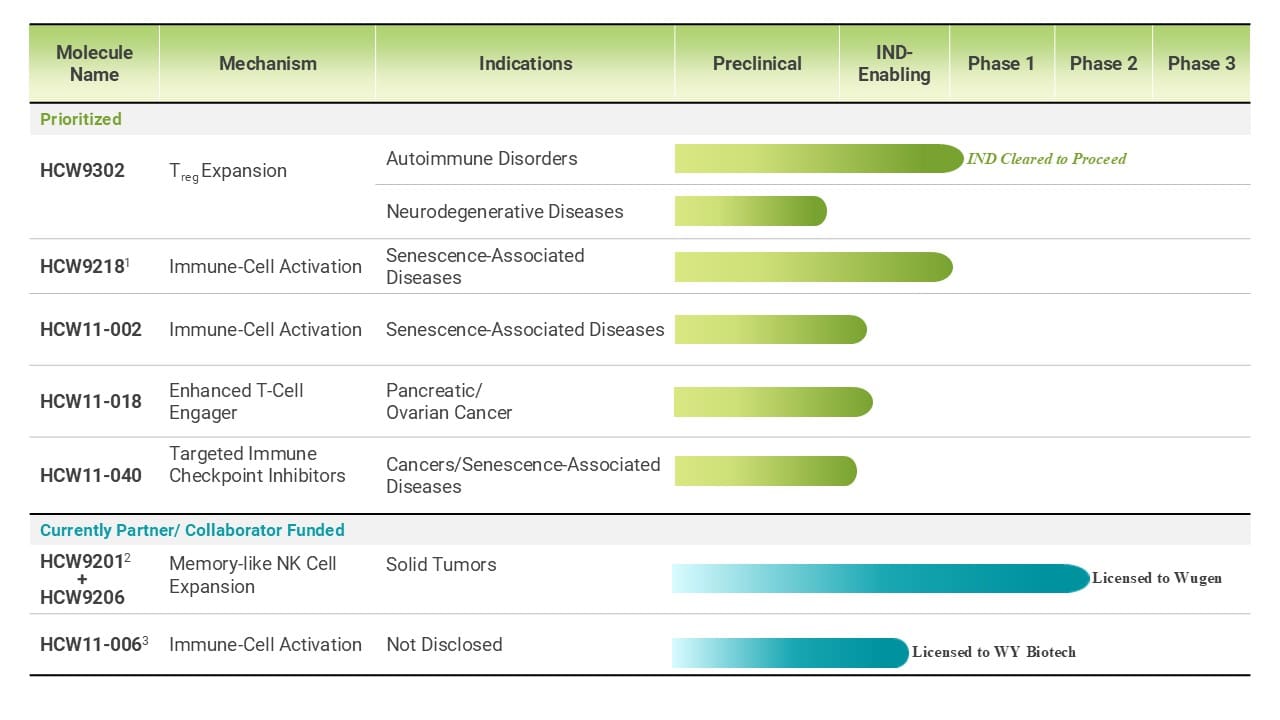Our Pipeline
HCW Biologics is a clinical-stage company advancing a pipeline of potentially transformative immunotherapeutic product candidates for the treatment of diseases promoted by chronic inflammation, especially age-related diseases, including those diseases that diminish quality of life.

- As a result of the Settlement Agreement and Release HCWB entered into with ImmunityBio on July 13, 2024, the Company retains perpetual, exclusive worldwide rights to develop immunotherapeutic treatments based on HCW9218 for aging-related diseases other than cancer. Our ability to continue development of HCW9218 depends on a supply agreement with ImmunityBio, who controls the master cell bank. ImmunityBio is obligated under the terms of the Settlement Agreement to enter into a supply agreement with the Company not later than January 2025. As of the reporting date, we have not received a draft of the supply agreement.
- Wugen’s lead clinical program, WU-NK-101, is based on molecules licensed from our Company (HCW9201 and HCW9206). We have retained all other rights to HCW9201 and HCW9206, including, but not limited to, manufacturing rights and treatment based on subcutaneous injection.
- WY Biotech holds the exclusive worldwide license rights to HCW11-006 for in vivo applications.
HCW9302 Program
Our lead molecule, HCW9302, is an injectable single-chain, IL-2-based fusion protein. Preclinical studies in mouse models have demonstrated the ability of HCW9302 to activate Treg cells and reduce inflammation-related diseases, supporting the potential of HCW9302 to treat a wide variety of autoimmune and age-related diseases. The Company has submitted an Investigational New Drug application (“IND”) to the FDA for a Phase 1 clinical trial to evaluate HCW9302 in an autoimmune indication. On January 28, 2025, the Company obtained clearance of its IND from the FDA to initiate a first-in-human Phase 1 dose escalation clinical trial to evaluate HCW9302 in patients with alopecia areata, a common autoimmune disease in humans that currently has no curative FDA approved treatments. This will be a Phase 1, open-label, multi-center Company-sponsored trial with competitive enrollment. The Company has also identified clinical investigators and sites interested in conducting this study. The study involves dose escalation to determine the toxicity profile of HCW9302 and to designate a dose level for the Phase 2 expansion phase, or the Recommended Phase 2 Dose (“RP2D”). In the first stage of the study, HCW9302 will be administered subcutaneously in a single dose. Depending on the results of the single ascending dose stage, a multi-dose study of HCW9302 administered subcutaneously will be considered.
With the start of the first-in-human clinical trial for HCW9302 in alopecia areata, we are one step closer to advancing a potentially transformative immunotherapeutic treatment of autoimmune diseases. This trial is a milestone for our Company, and the beginning of clinical development of treatments for quality-of-life indications. While not life-threatening, alopecia areata has no cure and diminishes the quality of life for those suffering with this disease. Existing treatments may provide some relief of symptoms, but there are often dangerous side effects. If this Phase 1 study is successful, we intend to rapidly expand clinical development of HCW9302 in Phase 2 studies in patients with other autoimmune diseases and serious inflammatory conditions, including other dermatological conditions, graft rejection, and neurodegenerative diseases.
HCW9218 Program
HCW9218, is an injectable, bifunctional fusion protein complex that innovatively combines a TGF-β receptor to neutralize a highly immunosuppressive cytokine secreted by tumors, and IL-15, a potent cytokine, to stimulate natural killer (“NK”) cells and CD8+ T cell cytotoxicity.
A Phase 1 dose escalation clinical trial (NCT05322408) of subcutaneous HCW9218 in patients with chemotherapy-refractory solid tumor cancers has been completed at the Masonic Cancer Center, University of Minnesota. A total of 18 patients participated in this study, with over 66% of patients with ovarian cancer (4/6) showing evidence of stable disease after receiving HCW9218 at 0.5 mg/kg or greater. While two dose-limiting toxicities (“DLTs”) were experienced, neither of these events triggered treatment stopping rules. The most frequent treatment-related adverse events (at least possibly related to the study medication) were injections site reactions, flu-like symptoms and decreased lymphocyte counts, all of which are consistent with previous clinical experience with IL-15-based therapies. Stimulation of NK and CD8+ T cell responses and neutralization of TGF-β were also observed in patients, consistent with the results of preclinical studies. This trial met its primary endpoints, including determination the Recommended Phase 2 Dose (“RP2D”) for future clinical development.
While the Company does not plan to pursue further use of HCW9218 in cancer indications, future clinical development of HCW9218 in other indications will employ the subcutaneous RP2D and treatment schedule defined in its oncology clinical studies. The Company is currently assessing a number of indications broadly categorized as “quality of life” – including aesthetics for deep wrinkles and senile lentigo – in search of candidates to advance HCW9218 in clinical development.
HCW9206 Program
HCW9206 is a fusion protein complex created with the TOBI platform based on common gamma chain (γc) cytokines IL-7, IL-15 and IL-21, which are known to play important roles in NK cell and T cell homeostasis. We hold the rights to the injectable form of HCW9206, and ex vivo rights are licensed to Wugen. This molecule is designed to broadly activate the immune system to support expansion of NK cells and T cells ex vivo and in vivo.
We are currently in the discovery stage of HCW9206, which is to create an injectable immunotherapeutic. We believe our preclinical testing of HCW9206 has demonstrated that this complex can support infused NK cells for a long duration and enable NK cells to sustain cytotoxicity against tumor cells. In addition, we are currently conducting preclinical studies to investigate the use of HCW9206 to enhance vaccine efficacy in different vaccine models as well as to support CAR-T cells in vivo.
Based on the recent preclinical findings, HCW9206 could potentially provide a new pathway for generating chimeric T-cell receptor – T cells (CAR-Ts) for immunotherapy with increased function. HCW9206 is a novel class of immunotherapeutics that enables a single molecule to deliver synergistic signals from three different immune-stimulatory cytokines. The activity of HCW9206 was significantly superior compared to standard methods employing anti-CD3/anti-CD28 and IL-2 reagents for CAR lentiviral transduction and subsequent expansion and persistence of human CAR-Ts. It could be a promising revolutionary reagent to replace anti-CD3/anti-CD28/IL-2-based approaches to streamline and lower the costs of CAR-T manufacturing. The GMP master cell bank of HCW9206 and its manufacturing process has been established, and its drug master file as an ex vivo reagent has also been filed with the US Food and Drug Administration.
TRBC Programs
We have developed a second-generation drug discovery technology, the T-cell Receptor β Chain constant region (“TRBC”) drug discovery and development platform, to design immunotherapeutics that not only activate and target immune responses but are also equipped with receptors that specifically target cancerous or infected cells. Further preclinical evaluation studies are currently being conducted for three molecules we have selected based on promising early data. These include HCW11-002 which we are evaluating in senescence-associated diseases, the second-generation immune checkpoint inhibitor we call HCW11-040, and an immune cell engager HCW11-018.
Our future clinical development will focus on our TRBC drug discovery and development platform. The Company has constructed over 50 compounds using the TRBC platform, which we group into three different classes, as defined by their construction and potential mechanism of action. The below summarizes our preclinical TRBC programs by classes:

Other Programs
Part of the Company’s strategy is to license marketing rights and other rights that are outside of our core focus.
In 2020, we entered into an Exclusive Worldwide License Agreement with Wugen Inc. for two molecules constructed with our TOBI platform, for the rights to use these molecules to develop cell-based therapies for cancer. Part of the Company’s upfront license fee was paid in Wugen common shares, which currently represent a 5.6% ownership interest in Wugen. The Company retained manufacturing rights for the license molecules.
In 2024, we entered into a License, Research and Co-Development Agreement with WY Biotech for HCW11-006, which was built with our TRBC platform technology. HCWB has a payment-free, milestone-free, and royalty-free option to recapture the development and commercialization rights of this molecule for the United States, Canada, Central America, and South America (Opt-in Territory) after the conclusion of the Phase 1 clinical trial. There is no cost for exercising the Opt-In Rights. WY Biotech completed its due diligence related to HCWB’s technology transfer report, including the characterization of the cell line, delivered on May 13, 2025.
The Company continues to evaluate its portfolio to identify compounds which may be good candidates for licensing or other collaborations, where it will be to our advantage to leverage the expertise and financial strength of a partner in the development of a compound.

